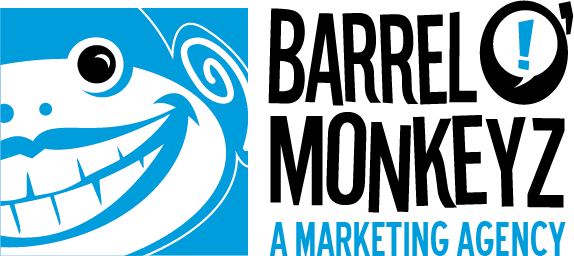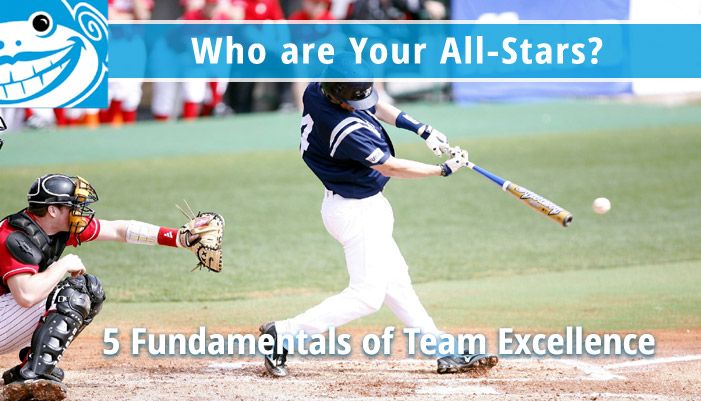This week was time for the annual MLB All Star Game—a time for the American League and National League to showcase their best talent. Watching the game got me to wondering why companies—rank and file businesses—don’t field their own all-star teams. Call me a crazy monkey, but a business team’s contributions to its organization’s bottom line, not to mention the local, state, and even national economy deserves some sort of recognition, don’t you think?
I watched Monday night’s Home Run Derby with great anticipation. No, I don’t think it’s “what baseball is all about,” despite the announcers and a few of the players seemingly saying so at every turn—but I do think it’s a great opportunity to “ooh” and “ah” at some prodigious blasts to the far reaches of Marlin’s Stadium. Plus, for me, it was a chance to see 21-year-old rookie Cody Bellinger (who hails from “my” LA Dodgers who just so happen to have the best record in baseball right now) slug it out with the NY Yankee’s Aaron Judge. Bellinger put up a good fight, but the 6-foot 7-inch, 280-pound Judge was just a beast, launching shot after shot over the fences. It was an impressive performance, and it demonstrated just what it means to be an electric performer who gets results . . . at least as an individual basis. That, in my opinion, is what the Home Run Derby is all about—showcasing individual talent to drive the ball.
There’s nothing wrong with that, but what about team performance? How does individual skill and talent translate to making the team more productive?
Psychology Today attributes success in today’s work world to the ability of teams to be interdependent. In other words, individual team members don’t rely on just one person to get the job done, they rely on each other. They say in baseball that the double play is a perfect example of this interdependence.
Looking at your organization, would you describe your team as high-performing? Consider the following:
- The first step in being an effective team is to have WELL-DEFINED ROLES. In baseball or football (or any other “team” sport, that’s easy, you have positions to play). You would think having a role would be easy in companies, too. After all, don’t we all have positions and job titles? Perhaps, but just keep in mind that having a position/title doesn’t necessarily mean you know what’s expected of you day-in and day-out. That’s the role of your team leader or manager.
- Teams need to develop ways of working together, or TEAM NORMS. In organized sports, this of course encompasses the rules of the game, but also the way team members conduct themselves on the sidelines and off the field. It’s their way of acting around one another which, because everyone knows and agrees to them, builds trust and accountability. TheSociety for Human Resource Management (SHRM) lists examples of team norms such as open communication, early conflict resolution, regular evaluation of both individual and team performance, high levels of respect among members, a cohesive and supportive team environment, a strong work ethic that focuses on results, and shared recognition of team successes.
- STABLE ENVIRONMENTS tend to create focus and efficiencies. In baseball, long-time second base and shortstop duos are said to have an almost sixth sense when it comes to positioning for double plays. The same goes for NFL quarterbacks and their favorite receivers. High performing business teams benefit from the stability of long-term working relationships and shared experiences, too, which can boost effectiveness, communication, and productivity.
- While stable environments are desirable, stagnant environments are not. Teams must GROW AND ATTRACT TALENT. The New England Patriots are a prime example of a stable environment that does not remain stagnant. The team is built around a way of working (norms) with well-defined roles and stability in the form of the team’s ownership, coach, quarterback, and other key players. However, the Patriots do not hesitate to supplement, replace, or grow talent as needed to take on new challenges. Contrast that approach to the New York Yankees of the past half dozen years or so. An aging roster led to a stable environment with well-defined roles, but the team suffered as talent levels dropped. Only through an influx of new talent in the last year or so (see the aforementioned Mr. Judge) are the Yankees experiencing a bit of a resurgence this year. Successful companies are those who invest in ways to retain, attract, and grow new talent on a regular basis so they are continuously positioned to adapt to changes in the marketplace.
- Without CLEAR GOALS and an INSPIRATIONAL VISION for how to achieve those goals, teams are effectively treading water. We see it all the time in sports. Teams look great on paper—but something is missing. Most often that something is someone—either a coach or a veteran team presence, or both—who is able to rally the team around a set of common goals and motivate them to achieve those goals. Effective business leaders act in much the same way, inspiring and keeping their teams motivated.
Here’s a quick shout out to some of my Monkeyz All-Stars . . . or is that “Paul”-Stars?
Dina Daglas
Michael Duffy
Bill Ennis
Bob Ennis
Jack Gatlin
Jaclyn Mayer
Matt McGovern
Kim Merrill
Travis Perriera
Josh Slavin
Brianna Zantman
Who are the all-stars in your organization? Are they practicing these five fundamentals of team excellence? Do you, as team leader or business owner, contribute to their high performance? If so, how can you do more? If not, what must change in order for you to field your own team of all stars?
Paul June is King Monkey of BARREL O’MONKEYZ, a San Diego-based strategic marketing agency specializing in Sports and Active Lifestyle markets. We serve as a seasoned, outsourced marketing team for companies looking to ramp up sales and launch new products. Our barrel is full of talent and creative arms ready to prove we don’t just monkey around!

